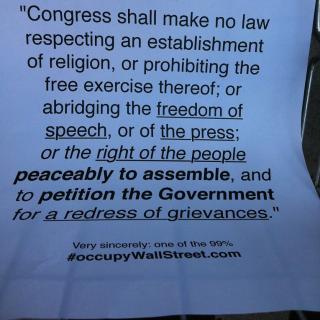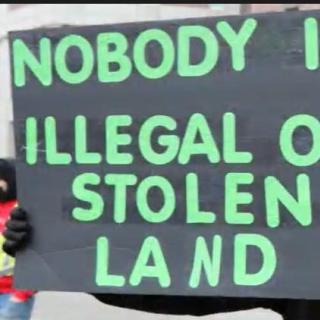Advertisement
The militarization of police forces in the U.S. has come under increasing scrutiny, including the effect it has on the psychology of police. Equipped with military-grade weapons and body armor, police have been conditioned to view citizens as enemies, instead of human beings whom they are bound to protect and serve.
Wearing face shields or gas masks has the psychological effect of deindividuation: a feeling of anonymity that curbs police officers’ sense of personal responsibility for their actions.
These effects played out in downtown Columbus on the evening of January 30 as a demonstration against President Trump was winding down. About 3,000 protesters were marching from the Franklin Country Courthouse back to the Ohio Statehouse, as police attempted to keep them off High Street by forcing them onto the sidewalk.
“The police were probably expecting only 500 people,” said Free Press editor Bob Fitrakis. “What they were doing was dangerous. People were down there with young kids. The cops were forcing and compressing people. It made no sense at that time of day. They could have let people use a lane of the street. It was a deliberate attempt to assert control when it wasn’t called for.”
About 200 people occupied the south crosswalk at the intersection of South High and State Streets. “It was at the urging of our Muslim and immigrant brothers and sisters,” said Puja Datta. “They really wanted to do it, and we felt that we should support them.”
Police did not deploy the Long-Range Acoustic Device (LRAD) that they acquired in November. Instead they put on gas masks and prepared aerosol canisters with a mixture of pepper spray and tear gas.
“Two minutes before they sprayed us, we were all holding hands and kneeling while our Muslim friends prayed,” Datta said. “There was a real sense of solidarity.”
Datta views the police action as painfully ironic in light of the announcements by Mayor Ginther and City Council President Klein made earlier that day, pledging to oppose President Trump’s executive order to deny rights to immigrants and Muslims.
“The cops had no interest in settling things with us,” she said. “No one talked to us. No one tried to negotiate anything. They came in ready to fight. They especially targeted women of color.” Datta was sprayed by police in the face, disintegrating the contact lens in her left eye.
“There was no need for them to put on riot gear. There was no need for them to pepper spray us,” said Hana X Abdur Rahim. “A lot of Muslim and black children were there. We didn’t want to just leave them out there, because the high schoolers said this was their first time at a protest.”
Children as well as adults were sprayed, Rahim said. “They went after specific individuals, including myself,” Rahim said. “A cop sprayed me in my face, at close range.” A contact lens fused to her eye.
“Several ambulances were dispatched to the area to treat a handful of people for symptoms from the spray,” the Columbus Dispatch reported. “Most units were not needed and returned to service.” But eyewitnesses and The Mockingbird say that dozens were affected, not a handful. Hana Rahim requested treatment from an EMT and was refused. “He said there was nothing he could do about the pain,” she said. “He told me, ‘It’s supposed to burn. What did you expect?’
“Even as I was in pain, the cops were mocking me,” Rahim said.
“I saw on the news later that they helped a white kid on the scene,” Rahim said. “They had saline on their ambulances and were rinsing people’s eyes out. The EMT who refused to help me knew that he had that equipment on his truck.”
Rahim may have been targeted for tear gas and refused treatment because of her role in shutting down a Columbus City Council meeting last September. “I’ve been visible since the death of Ty’re King,” she said. “I’ve spoken against the mayor and the chief of police at protests. They know who I am.”
Volunteer medics were also on the scene to support the protesters, administering Maalox to flush their eyes. A police cruiser deliberately bumped into one of the medics, Atticus Garden, who was then arrested.
Jesse Kloth observed some hesitation from police during the standoff, after officers donned gas masks but before they sprayed the protesters.
“We were standing there to see if they would do it,” Kloth said. “And they were trying to see if they would do it. It’s like they really wanted to, but it seemed like something was holding them back for a long time.”
Perhaps the officers needed the time to shed some layers of their humanity.









